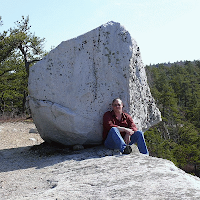Historical Geology is not the history of geology (although that is partially covered) but the history of the Earth and, relating to the topic of this post, the origin and evolution of life on Earth (which is, of course, preserved in the geologic record). While not a biologist, I do teach about biological evolution since it's completely impossible to discuss fossils and the history of life without that framework.
This does present challenges in my class for three reasons. First, I teach at a rural community college and a number of my students are skeptical of evolution (I've even run into some young-Earth creationists). Second, most of my students have not studied biology at the college level, only in high school, and we now know from recent studies that many high school teachers cover evolutionary theory in a minimal way, if at all. And, third, I only have one class period to discuss evolution by itself (hey, it's hard to cover 4.5 billion years of geologic history in one semester!).
So how do I approach teaching evolution? The textbook I use (The Earth Through Time
In Chapter 1, Variation Under Domestication, Darwin gives examples of variation artificially introduced via selective breeding. He spends a lot of time talking about pigeons since fancy pigeon breeding was a popular pastime in 19th century England. Darwin argued that laws of heredity (even though he had no understanding of DNA, etc) and artificial selection by human breeders creates these varieties. Nobody in my class finds this controversial since we all can see variation under domestication in our everyday lives (e.g. dog breeds). If I stopped there, some might argue by analogy that this is evidence for Intelligent Design. But let's continue...
In Chapter 2, Variation Under Nature, Darwin discusses examples of variation in animals and plants in nature. Anyone who has tried to use a field guide to identify birds or flowers out in the real world knows that there is some degree of natural variation among animals or plants of the same species. Darwin notes that it's often hard to distinguish separate species from variations within a species and concluding that the amount of difference between species must be greater than the amount of difference between varieties within a species. All of these natural variations among organisms, Darwin implies, is evidence against the special creation of discreet species.
In Chapter 3, Struggle for Existence, Darwin starts to gets to the heart of his argument and talks about the struggle for existence, referencing the work of British economist Robert Malthus (1766-1834). Nature, as poet Alfred, Lord Tennyson wrote in 1850, is "red in tooth and claw." There is a finite amount of resources (food, mates, living space) and living things must compete for there.
In Chapter 4, Natural Selection, we get to the concept of survival of the fittest. If we acknowledge that there's variation among organisms of the same species in nature, and we acknowledge that there's a struggle for existence, we can see that some variations may be beneficial to the survival (and mating opportunities) for the organism while other variations may be harmful. Beneficial adaptations are successfully passed on and over time this will lead to change.
That's basically all biological evolution is - genetic change over time. It's a fact, something we can measure and quantify. One commonly used definition for evolution is that it's any change in the frequency of alleles (alternative forms of a gene) within a gene pool from one generation to the next. Darwin saw this change as slow and gradual (today called phyletic gradualism) but there's pretty good evidence today from the fossil record that evolutionary change can occur rapidly (geologically rapid, not rapid in terms of an organism's life span).
 In Chapter 5, Laws of Variation, Darwin attempts to explain how laws of heredity work and mostly gets it wrong. It's hard to fault him, however, since it took another 100 years before we really started understanding (and still don't fully understand) and genetics and DNA really work. That's why modern evolutionary theory is sometimes referred to as NeoDarwinism, it's Darwin's ideas with the addition of modern genetics. Darwin's theory of evolution was strengthened considerably by what we've learned in modern biology.
In Chapter 5, Laws of Variation, Darwin attempts to explain how laws of heredity work and mostly gets it wrong. It's hard to fault him, however, since it took another 100 years before we really started understanding (and still don't fully understand) and genetics and DNA really work. That's why modern evolutionary theory is sometimes referred to as NeoDarwinism, it's Darwin's ideas with the addition of modern genetics. Darwin's theory of evolution was strengthened considerably by what we've learned in modern biology.In Chapter 6, Difficulties on Theory, Darwin shows why what he did is science and not pseudoscience. He acknowledged that there were difficulties with his ideas (in 1859, mind you, that doesn't mean they are still difficulties today!). Darwin admits he has a hard time, for example, explaining the evolutionary development of the eye. He then proceeds, however, to outline a plausible evolutionary scenario, one which modern biologists have refined only slightly through new discoveries.
Chapter 7, Instinct, is basically additional material on natural selection and Chapter 8, Hybridism, discusses hybrid animals, like the mule, and how they affect his theory. This chapter suffers from Darwin's lack of knowledge of modern genetics (again, perfectly understandable).
In Chapter 10, On The Geological Succession of Organic Beings, Darwin discusses natural selection some more as it relates to the fossil record and talks about extinction. Many of the areas Darwin admitted to having difficulties understanding are no longer problems with our increased knowledge of the fossil record and modern genetics.
In Chapter 11, Geographical Distribution, and Chapter 12, Geographical Distribution continued, Darwin discussed the importance of geographical changes, like the isolation imposed by island environments, on natural selection and speciation. Here he was heavily influenced by his earlier work in the Galapagos Islands.
In Chapter 13, Mutual Affinities of Organic Beings: Morphology: Embryology: Rudimentary Organs, Darwin links existing taxonomic classification schemes with his theory of common descent with modification. In other words, organisms are classified into phyla, classes, orders, families, genera, and species on the basis of shared characteristics and these are evidence of biological evolution. He also discusses imperfections in organisms which is an argument against any intelligent design (a designer would have done a much better job, not just kludged together existing systems seen in more "primitive" organisms).
Chapter 14, Recapitulation and Conclusion, wraps it up:
"There is grandeur in this view of life, with its several powers, having been originally breathed into a few forms or into one; and that, whilst this planet has gone cycling on according to the fixed law of gravity, from so simple a beginning endless forms most beautiful and wonderful have been, and are being, evolved."
After working through the book, students see that it's not really very controversial at all (unless their minds are already closed based on their belief in a specific interpretation of Scripture). I then move into an introduction to DNA and genetics and show how this knowledge has only strengthened Darwin's theory of evolution. I also encourage students to actually read The Origin of Species.
We also spend a lot of time looking at rocks and fossils in both the lab and in the field throughout the semester and it's hard not to believe in evolution after seeing it with your own eyes!










As you correctly point out, it is closed minds that will not accept the idea under any circumstances. It is actually frightening for some who have been told their faith depends on believing a literal six day creation, and if that isn't true, then nothing else can be true either. I've found that it is helpful to acknowledge their beliefs, but that they need to understand the difference between belief and confirmation by evidence. As such, I tell them that I am not challenging their beliefs or their right to believe, but that I do insist that they understand why geologists and biologists accept the findings on evolution. I've had some surprising results with this approach.
ReplyDeleteYou've written a great blog post here!
I didn't read The Origin of Species until I was in grad school, but I wish that any one of my undergrad profs had encouraged us to do so. I think I would have benefitted- and even enjoyed- reading it sooner. Good on ya!
ReplyDeleteSome of the closed minds may be opened by your approach - and that may occur at in the future without you knowing about it. (One can only hope!) Great post!
ReplyDelete"Geology assuredly does not reveal any such finely-graduated organic chain (intermediate links) and this perhaps, is the most obvious and serious objection .... against this theory"
ReplyDeleteCharles Darwin
Just showing your ignorance Anonymous by quote mining...
ReplyDelete1. Who cares what was thought over 150 years ago? No bearing on the modern science of biology. I think science has advanced a bit since the 1850s (unlike religion).
2. Darwin spent some some discussion this problem in his day. Ever read the actual work?